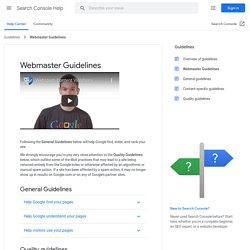

Libellous URLs Are Hilarious. Except That One Time I Nearly Went To Jail. An interesting story today from Nieman Journalism Lab, pointing to the dangers of URL spoofing.

The danger, according to Neiman’s Andrew Phelps, stems from the fact that many news organizations include the text of headlines in their URLs in order to improve SEO. In many cases, the headline text is superfluous, and the URL works just fine without it. The result? A story from the UK’s Independent newspaper that started out with this URL… …went viral, after a prankster tweeted it out as… (Both URLs work just fine.) Embarrassingly, and amusingly, several news organizations including Slate and Nieman itself, fell foul of the prank, assuming that it reflected an error at the Independent. Webmaster Guidelines (God's voice !) Following the General Guidelines below will help Google find, index, and rank your site.

We strongly encourage you to pay very close attention to the Quality Guidelines below, which outline some of the illicit practices that may lead to a site being removed entirely from the Google index or otherwise affected by an algorithmic or manual spam action. If a site has been affected by a spam action, it may no longer show up in results on Google.com or on any of Google's partner sites. General Guidelines Ensure that all pages on the site can be reached by a link from another findable page. The referring link should include either text or, for images, an alt attribute, that is relevant to the target page. Ways to help Google find your site:
Content Marketing. Black/White hat. Ranking factors. Page Rank Sculpting. Google updates. Please Exit The Link Building. I’ve never been as irritated with SEO buzzwords as I am now.

Each blog post scanned and tweet looked at means another near-certainty I’ll read about paid links, how content is king, SEO is dead, and now, my new itch – link building – is a relevant description for building five links a week. Each has it’s own special place in my quickly blackening heart, and each one draws in me a special ire that adds more and more gray hair to my head with each predictive rising sun. Link building is the least ire-evoking term of the bunch, but nonetheless, the way I hear it talked about and the way I hear it done makes the term – link building – and what it evokes something way more literal than it should be. Lessons Learned at SMX West: Google?s Farmer/Panda Update, White Hat Cloaking, And Link Building. An amazing amount of great information came out of SMX West this week.

Below is a summary of some of what I found to be the most actionable and useful. Google’s Own Words About the Farmer/Panda Update Google’s Matt Cutts said that while the change isn’t 100% perfect, searcher feedback has been overwhelmingly positive. He noted that the change is completely algorithmic with no manual exceptions. Blocking “Low Quality” Content Matt reiterated that enough low quality content on a site could reduce rankings for that site as a whole. For instance, a business review site might want to include a listing for each business so that visitors can leave reviews, but those pages typically have only business description information that’s duplicated across the web until visitors have reviewed it. In cases like this, Google’s Maile Ohye recommended using a <meta name=robots content=noindex> on the pages until they have unique and high-quality content on them. Ad-To-Content Ratio Slowed Crawl It’s true.
Tools. SEO blogs. Is Product Iteration Always The Best Answer? A look at Mahalo 4. This article outlines the major changes that Mahalo 4 is founded on and explains why Mahalo is announcing the 4th re-invention of their company. In the article, Mahalo’s revenue streams are exposed and a brief history of the iterations that have occurred in the past are presented to explain how these pivots could be hurting the company more than helping it. On January 25th, 2010 at the DLD Conference (Digital, Life, Design) conference in Munich, Jason Calacanis announced the 4th major “pivot” in Mahalo.com’s history. In online business, a pivot is when a company significantly changes its strategy to accommodate changing market trends, new technological advancements, or simply to try to make more money.
Pivoting is typically associated with small, single product companies that can make radical shifts in order to maintain or gain profitability. Pivot, Pivot, Pivot The video above was presented at the DLD conference and then quickly posted online. Video Production Mahalo exists to earn money.